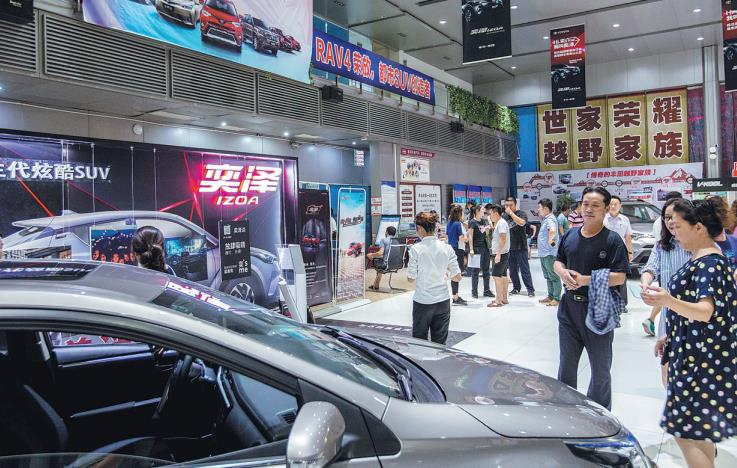Long-term mindset urged as vehicle sales fall for 11 months

More pressure for carmakers predicted as rules to tighten in Chinese market
The new vehicle market in China declined again in May - even the booming new energy vehicle sector was affected - and the country's leading industry association called for a long-term mindset.
According to the statistics from the China Association of Automobile Manufacturers, May marked a fall in the country's overall automotive market for 11 months in a row.
Sales reached 1.91 million, down 16.4 percent year-on-year and 3.4 percent compared with April.
In the first five months of 2019, sales totaled 10.27 million: a decrease of 13 percent from the same period last year.
Passenger cars, the majority of vehicle sales, saw a 17.4 percent fall year-on-year with deliveries of 1.56 million units in May.
Commercial vehicles sold 351,000 units in May, a decrease of 11.8 percent year-on-year.
Xu Haidong, an assistant to the CAAM's secretary-general, said the gradual introduction of State VI emission standards hurt sales.
A total of 18 provinces and municipalities will adopt stricter State VI emission standards from July. With this in place, models built to State V standards are not allowed to be registered.
Sales in regions with the new standards account for more than 50 percent of China's total, which severely hit the new vehicle market, according to Xu.
The application of the State VI emission standards comes a year earlier than the national plan.
This has not given car manufacturers enough time to adjust their production lines, Xu said.
Car production is doing worse than sales: it fell 21.2 percent year-on-year with 1.85 million units in May.
"In that case, potential customers choose a wait-and-see attitude as there are only a few models in line with the new standards," Xu added.
Shi Jianhua, deputy secretary-general of the CAAM, said: "Chinese brands were affected first amid the continued downturn, which should improve their competitiveness and focus on long-term development."
According to the CAAM, a total of 3.33 million Chinese brand passenger cars were sold in first five months of 2019.
This is a slump of 23.4 percent compared with the same period last year. The market share of Chinese passenger car brands declined 4.2 percentage points to 39.7 percent.
Only three of the top 15 Chinese passenger car brands saw slight increases in the first five months. They are Great Wall Motors, BYD and Hawtai Motor.
SAIC Motor Corp, the best-seller of Chinese passenger cars for 14 years, saw a year-on-year decrease of 28.1 percent in first five months to 769,000 units.
Geely dropped 13.8 percent year-on-year to 563,000 units in the same period.
The association expects an upturn in the second half of this year when carmakers start to release their State VI vehicles and customers make their decision.
Once energized by rapid growth, the new energy vehicle sector is also affected by national policies.
The growth of new energy vehicles slowed pace last month, a meager 1.8 percent growth year-on-year, with sales standing at 104,000 units.
One of the main reasons is commercial new energy vehicle sales, which plunged 53.7 percent year-on-year with 9,000 units delivered last month.
In March, Chinese authorities announced they would stop offering favorable tax subsidies for new energy buses after June 25. This resulted in a rush to buy in earlier months and now a sales slump, according to Xu.
In addition, customers in cities where State VI emission standards will not be enacted soon will prefer State V vehicles that have been heavily discounted, Xu added.
China is releasing some policies to stimulate car sales. Earlier this month, the National Development and Reform Commission called on local authorities to remove restrictions on the purchase of new energy vehicles.
Local governments that have enforced restrictions on vehicle purchases should speed up changes depending on their situation, the commission added.
The policy will bring positive effects to the passenger car market and help boost the new energy vehicle sector, according to the CAAM.
Shi said some policies, such as the restriction purchase of vehicles, had a negative effect on the development of the auto industry and carmakers.
He added the market needs a healthy and long-term development concept.

